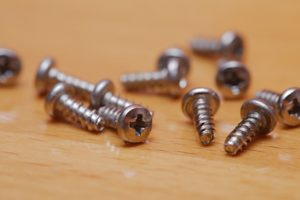 Human beings have been using threaded screws for at least 2,000 years, and you can find these vital tools in virtually every building and mechanical device on the planet. For thousands of years, the technology behind screws and fasteners remained largely unchanged. While the materials the screws were made from evolved over the millennia, the technology itself remained the same.
Human beings have been using threaded screws for at least 2,000 years, and you can find these vital tools in virtually every building and mechanical device on the planet. For thousands of years, the technology behind screws and fasteners remained largely unchanged. While the materials the screws were made from evolved over the millennia, the technology itself remained the same.
Check out our EZ Screw Builder to build your custom screw!
However, when screws started to be used in mechanical devices like engines, which exposed them to extreme temperatures, engineers were forced to create new custom screw options. As a result, the 20th and 21st century have seen major changes to this technology. That’s because even though this simple technology has proved invaluable to the human race, it’s not perfect, and threaded fasteners are especially vulnerable to fastener failure caused by temperature and vibration.
So whether it’s the large screws and nuts used in your automobile or the miniature screws and micro fasteners used in your smartphone, thread lockers have become a popular feature for engineers who require custom screw options.
There are two primary types of thread lockers used today, inert and reactive thread lockers, but the general principle behind these types of screws remains the same. Thread lockers help bind the screw in place to protect against heat and cold, vibration, shock, corrosion, and natural wear and tear. To prevent costly and dangerous fastener failure, many engineers want some type of thread locker in custom screws.
Inert thread locker types rely on the concept of prevailing torque, which refers to the amount of torque required to secure a screw into a fastener. In most cases, a nylon insert is added to the upper threads, which helps make the screw immune to self-loosening caused by vibration or shock. The nylon insert helps lock the screw into place, creating a long-lasting connection.
Reactive types of thread lockers rely on a chemical adhesive, which is applied to the threads. Once the screw has been secured, the adhesive creates a strong seal to prevent fastener failure. In addition to protecting against vibration and shock, reactive thread lockers also create a seal that prevents gasses and liquids from passing through the fastener. They also help protect custom screws from temperature changes, as reactive thread lockers can withstand temperatures ranging from −54 to 149 degrees Celsius.
For all these reasons, thread lockers are a popular choice when engineers are looking for custom screws. To find out more about our custom screw options for your next project, contact us today for more information.

 Human beings have been using threaded screws for at least 2,000 years, and you can find these vital tools in virtually every building and mechanical device on the planet. For thousands of years, the technology behind screws and fasteners remained largely unchanged. While the materials the screws were made from evolved over the millennia, the technology itself remained the same.
Human beings have been using threaded screws for at least 2,000 years, and you can find these vital tools in virtually every building and mechanical device on the planet. For thousands of years, the technology behind screws and fasteners remained largely unchanged. While the materials the screws were made from evolved over the millennia, the technology itself remained the same.